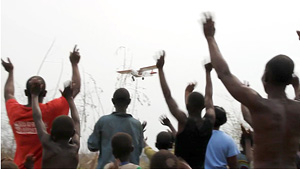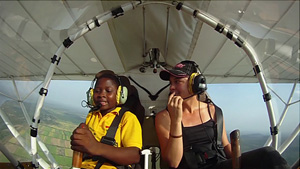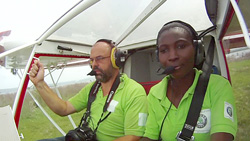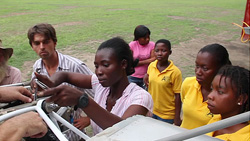 |
| Add caption |
Lake Volta, the world's largest artificial lake, gives Medicine on the Move access to many remote villages by floatplane. The Akosombo Dam supplies hydroelectric power to Ghana, but the flooding of the lake cut off ground transportation to rural communities around it. Mawuli Nyekodzi said people in these villages often don’t know about principles of water sanitation, and practices such as throwing cow dung in wounds sometimes result in amputations or gangrene. Spending several hours with people in a village can help them take control of their health.
 |
| Add caption |
Airshow performer Melissa Pemberton joined Mawuli Nyekodzi and others for the latest Fly Me Day. She said she found out about the work at Kpong and Mawuli Nyekodzi’s determination in an email from Medicine on the Move founder Jonathan Porter.
 |
| Add caption |
“For me, right inside me, I thought that’s where I belong,” she said. While no other woman had earned Ghana’s national pilot certificate, Mawuli Nyekodzi started training.
 |
| Add caption |
“They shouted, ‘Oh you, come here, come and help us!’ And I went over there and I helped them,” she explained. She watched what the builders did to secure the wing and did the same. They were impressed with her proficiency and attention to detail—that she had quickly grasped the mechanical principles to secure the wing properly, just as she had taken to pulling up stumps.
 Patricia Mawuli Nyekodzi was cutting trees in the bush of her home country, Ghana, when she saw the airplanes flying low overhead.
Patricia Mawuli Nyekodzi was cutting trees in the bush of her home country, Ghana, when she saw the airplanes flying low overhead.
The aircraft piqued her interest but frightened her. She had never seen an airplane come so close. Why were they chasing her?
She hid, but the image of those aircraft stayed with her. Mawuli Nyekodzi set out to the nearby Kpong Airfield one day and asked why the airplanes had been chasing her. They weren’t, the workers at the airfield told her; they were practicing touch-and-goes,
she later recalled.
she later recalled.
Now able to get a good look at the airplanes on the field, Mawuli Nyekodzi knew she wanted to be around them somehow. She asked if there was anything she could do there as she waited for her results from school, and was given a cutlass and mattock to pull out tree stumps and cut the grass on the field. Physical labor like that is typically men’s work in Ghana, but Mawuli Nyekodzi jumped into it without hesitation.
“Where I come girls are not … associated with pulling out tree stumps and things like that—it’s a job for boys,” she told AOPA. “So I just went in there and I did it. Being around the planes—that’s all I wanted.”
Her hard work paid off. Mawuli Nyekodzi earned her private ultralight pilot certificate on her twenty-first birthday to become the first woman to earn the West African country’s national pilot certificate and is now an aircraft builder, Rotax technician, and flight instructor. The 23-year-old Ghana native is grateful for the opportunities she had at Kpong and gives back by teaching other young women to build, maintain, and fly airplanes; she also flies volunteer missions for the medical charity Medicine on the Move.
Stumps to crankshafts
Mawuli Nyekodzi tackled the strenuous tasks of pulling up stumps and clearing brush with characteristic verve, erasing doubts that a woman could keep up with the men. Medicine on the Move founder Jonathan Porter wrote when Mawuli Nyekodzi earned her certificate that she took to the job with seeming ease:
“The male staff members tried to compete ... I do mean tried, because they really struggled to keep up with her—and some abandoned the competition!”
Kpong Airfield, the largest private airport in Ghana, hosts Medicine on the Move and the aviation facility that supports it, Waasps. (The facility’s name originally came from the effort to get the operation approved, West African Aviation Solutions Proposal.) Mawuli Nyekodzi watched Waasps engineers assemble Zenith aircraft on the field as she worked. One day she saw them lifting a wing to put on an airplane and had an opportunity to help.
Within months of her start clearing brush on the field, Mawuli Nyekodzi had started a three-year apprenticeship as a trainee aircraft technician. Her work at Waasps—earning her Rotax certification, building and maintaining Zenith airplanes—paved the way for other young women to follow the same path. Porter said it is because of Mawuli Nyekodzi that the group at Kpong formed the Aviation Technology (AvTech) Academy, an aircraft building and maintenance school that is geared toward young women.
Waasps has completed six Zenith aircraft, with four under construction. Mawuli Nyekodzi speaks fondly of the STOL aircraft, which can land in as little as 20 meters (66 feet)—an asset in a country that according to the CIA World Factbook has only 11 airports in 92,000 square miles. She loves to service the Rotax engines, she said—especially the carburetors. She looks forward to outfitting one of the Zeniths with floats.
“For me, these are my babies,” she said.
‘Where I belong’
While working at Waasps, Mawuli Nyekodzi got a chance to join her boss on a short ferry flight. He let her take the controls, and once she had a taste of flying she never looked back.
After about six months of training, Mawuli Nyekodzi said, she was ready for her general flying test. But before she got a chance to head over to the airplane, she said, the examiner shouted that aircraft was on fire. Dismayed, she started crying—but she responded appropriately to what turned out to be a simulated emergency.
“I ran with my tears and I went for the fire extinguisher, and he said, ‘Now you have passed one stage of the test,’” she said.
Learning to fly in Ghana’s tropical climate calls for special attention to the weather, so Mawuli Nyekodzi had experience making a “no go” decision when ominous clouds started to build. A storm was brewing during her checkride, but she stayed aloft long enough meet the 90-minute requirement for her certificate. She came back to the airfield and greased the landing, she said, with camera crews waiting to document her accomplishment. It was her twenty-first birthday.
Now that she had earned her certificate, why couldn’t others? Mawuli Nyekodzi shares her love of flying at Fly Me Days, similar to a Young Eagles event, where she and others take people up for brief flights to introduce them to aviation.
“These short flights will just open their minds, give them an idea to be able to think about it and to see whether they want a career in aviation,” she said.
“Obviously, I was blown away by her story,” she said. She and her husband, Rex, spent a month with Medicine on the Move. She said what most impressed her was the perseverance of the workers at Medicine on the Move, and how much they had to work to take each step: building the airfield, establishing infrastructure, earning a pilot certificate.
“They’re nonstop all day, every day,” she said. Rex produced a documentary, The Calling, about Medicine on the Move.
Because Medicine on the Move had invested in her, Mawuli Nyekodzi gives back by flying volunteer missions for the organization, which transports health educators to isolated communities in Ghana. The STOL Zeniths and an X-Air on floats allow volunteer pilots to access remote villages in as little as 20 minutes when driving there might take a whole day, Mawuli Nyekodzi said.
On a typical mission, Mawuli Nyekodzi overflies the village to let the people know she has arrived. People assemble at the shore of Lake Volta, and some paddle out to the floatplane to welcome the guests. Health workers can spend as much as six hours with people in a village during one trip, she said.
“We want to be able to educate these people—not to just go and change their culture, but to encourage them to use what they have to help themselves so they can improve on their health,” she said.
Empowerment seems to be a theme at Kpong Airfield, where Porter said 22 pilot certificates have been issued. Mawuli Nyekodzi now teaches young women at AvTech and instructs in the aircraft she builds and maintains. Pilots there celebrated the “Centennial of Licensed Women Pilots” in 2010 with an event in which 97 women and girls got a chance to fly. In an area where people doubted if a woman could fly—or pull out stumps, or build airplanes—Porter said three girls are following in Mawuli Nyekodzi’s footsteps. She’s thrilled at the opportunity to teach them.
“When I got my license, I told myself if I have got this, it means other people can do this at the same time,” she said.